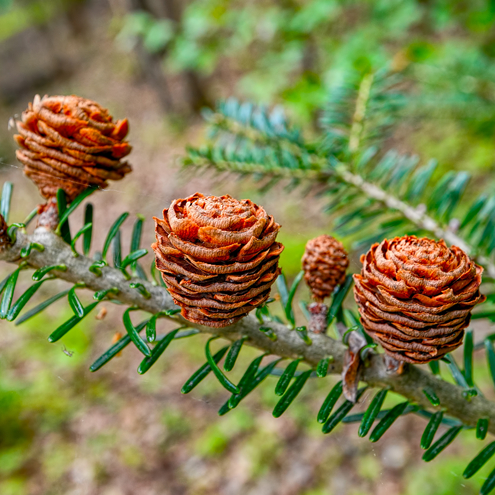
Korean pine
Scientific names: Pinus koraiensis
Family: Pinaceae
Alternate names: Borovica Kórejská, Borovice Korejská, Chinese Pinenut, Chōsen Goyō, Chōsen Matsu, Hong Song, Jatnamu, Korea Kiefer, Koreafyr, Koreai Fenyõ, Korean Nut Pine, Korean Pine Nut, Koreansembra, Koreatall, Kóreufura, Pi de Corea, Pin de Corée, Pino de Corea, Sosna Koreańska
Actions: Antifungal, Anti-inflammatory, Antitumor, Appetite-suppressant, Hypotensive, Immunological, Lipid-lowering
Background
Korean pine is a tree that grows in parts of Asia. The nuts of Korean pine are eaten as a food. The nuts, needles, bark, and resin are used as medicine.
Korean pine is used for earaches, nosebleeds, to increase milk production during breastfeeding, weight loss, and other conditions, but there is no good scientific evidence to support these uses.
Korean pine is used for earaches, nosebleeds, to increase milk production during breastfeeding, weight loss, and other conditions, but there is no good scientific evidence to support these uses.
Safety Safety definitions
When taken by mouth: There isn't enough reliable information to know if Korean pine is safe. Korean pine nut might cause allergic reactions in some people.
Allergy to pine and related plants: Korean pine nut might cause allergic reactions in some people. People who are sensitive to pine trees should avoid Korean pine nut.
Special Precautions & Warnings:
Pregnancy and breast-feeding: There isn't enough reliable information to know if Korean pine is safe to use when pregnant or breast-feeding. Stay on the safe side and avoid use.Allergy to pine and related plants: Korean pine nut might cause allergic reactions in some people. People who are sensitive to pine trees should avoid Korean pine nut.
Effectiveness
NatMed Pro rates effectiveness based on scientific evidence according to the following scale: Effective, Likely Effective, Possibly Effective, Possibly Ineffective, Likely Ineffective, Ineffective, and Insufficient Evidence to Rate.
Insufficient evidence Effectiveness definitions
- Abnormal levels of cholesterol or blood fats (dyslipidemia). Early research shows that Korean pine needle extract doesn't improve levels of blood fats in people with borderline dyslipidemia.
- Obesity.
- Earaches.
- Nosebleeds.
- Increasing milk production during breast-feeding.
- Parasites.
- Burns.
- Wound healing.
- Other conditions.
Dosing & administration
The appropriate dose of Korean pine depends on several factors such as the user's age, health, and several other conditions. At this time there is not enough scientific information to determine an appropriate range of doses for Korean pine. Keep in mind that natural products are not always necessarily safe and dosages can be important. Be sure to follow relevant directions on product labels and consult your pharmacist or physician or other healthcare professional before using.
Interactions with pharmaceuticals
Medications for high blood pressure (Antihypertensive drugs)
Interaction Rating=Moderate Be cautious with this combination.
Korean pine nut oil might decrease blood pressure. Taking it along with medications for high blood pressure might cause your blood pressure to go too low.
Some medications for high blood pressure include captopril (Capoten), enalapril (Vasotec), losartan (Cozaar), valsartan (Diovan), diltiazem (Cardizem), Amlodipine (Norvasc), hydrochlorothiazide (HydroDiuril), furosemide (Lasix), and many others.
Interactions with herbs & supplements
Herbs and supplements that might lower blood pressure: Korean pine nut oil might lower blood pressure. Using it along with other herbs or supplements that might also lower blood pressure could lead to blood pressure that is too low. Some of these products include andrographis, casein peptides, cat's claw, coenzyme Q10, fish oil, L-arginine, lycium, stinging nettle, theanine, and others.
Interactions with foods
There are no known interactions with foods.
vital.ly has licensed monographs from TRC Healthcare.
This monograph was last reviewed on 16/11/2023 11:00:00 and last updated on 02/12/2015 23:39:14. Monographs are reviewed and/or updated multiple times per month and at least once per year.
Natural Medicines disclaims any responsibility related to medical consequences of using any medical product. Effort is made to ensure that the information contained in this monograph is accurate at the time it was published. Consumers and medical professionals who consult this monograph are cautioned that any medical or product related decision is the sole responsibility of the consumer and/or the health care professional. A legal License Agreement sets limitations on downloading, storing, or printing content from this Database. No reproduction of this monograph or any content from this Database is permitted without written permission from the publisher. It is unlawful to download, store, or distribute content from this site.




